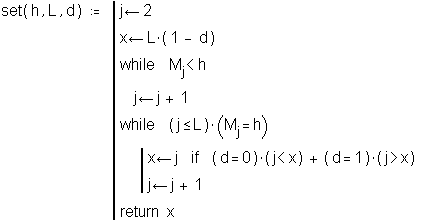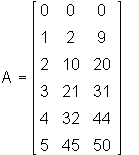Mathcad worksheet to calculate small sample tables
for percentage benchmarks.
Set benchmark.
![]()
Set probability of failing the benchmark at the reference sample size.
![]()
Set probability of failing the benchmark with small samples (Type I error rate).
![]()
Calculate the length of the Small Sample Adjustment Table
![]()
![]()
Calculate the reference (derivation) sample size.
![]()
![]()
"p" gives initial guesses at the required performance levels
![]()
The following function calculates the performance level that is consistent with the reference sample size N and criterion probability P.
![]()
![]()
![]()
This is the required performance level.
![]()
![]()
![]()
Calculate the minimum number of misses for which the cumulative probability is less than the Type I error criterion.

![]()
![]()
![]()

![]()
![]()
![]()
![]()
![]()
In the following matrix,
the first column is the number of permitted misses,
the second column is the minimum sample size that gets this number, and
the third column is the maximum sample size that gets the number.

Exhibit 4
Measures and sub-measures identified
as having no minimum samples size*
Measure 30: Wholesale bill timeliness.
Measure 40: Average time to respond to a collocation request.
Measure 41: Average time to provide a collocation request.
UNE Loop DS-3: (Disaggregated as an Service Group Type).
UNE-Transport DS-1: (Disaggregated within UNE-Transport).
UNE-Transport DS-3: (Disaggregated within UNE-Transport).
Interconnection Trunks.
OC level services: (Service group type).
* See Interim Opinion (D.01-01-037), App. H, Attach. 1. OC services were added since they were included as a service group type in D.01-05-087.


